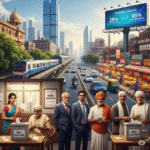New Delhi, India, 2025 — With over 65% of its population under the age of 35, India is home to one of the largest youth demographics in the world. This generation represents not just the future of the nation but also the driving force behind its democratic and developmental aspirations. The role of youth in shaping India’s democratic future is pivotal, as they bring energy, innovation, and a demand for accountability that can transform governance and society.
Youth as a Catalyst for Democratic Engagement
1. Rising Voter Participation
Young voters are becoming increasingly active in India’s democratic processes, influencing policies and political outcomes.
- Fact: The 2024 General Elections saw a 15% increase in first-time voter turnout compared to 2019, with 47 million new voters registered (Election Commission of India).
- Impact: This surge underscores the youth’s growing awareness of their role in shaping the nation’s policies.
2. Advocacy and Activism
India’s youth are at the forefront of social and political movements, advocating for issues like climate change, gender equality, and education reform.
- Example: Student-led climate strikes across India in 2024 highlighted the urgency of environmental policies, leading to increased funding for renewable energy in the Union Budget 2025.
- Impact: Youth activism pushes governments to address critical issues and fosters accountability.
3. Digital Democracy
Tech-savvy young Indians are leveraging digital platforms to engage in governance and policy discussions.
- Fact: Over 65% of India’s youth actively participate in online campaigns and surveys, using platforms like MyGov and Change.org (NASSCOM, 2024).
- Example: Digital petitions have played a role in influencing decisions, such as the repeal of contentious laws and increased transparency in public spending.
Challenges Hindering Youth Participation
1. Economic Inequality
Disparities in access to education and resources limit the potential of many young Indians.
- Fact: According to the NITI Aayog (2024), 22% of India’s youth are unemployed or underemployed, with rural areas facing the greatest challenges.
- Impact: Economic constraints prevent many young individuals from fully engaging in democratic and developmental activities.
2. Political Barriers
Despite being a large demographic, youth representation in legislative bodies remains low.
- Fact: Only 12% of elected representatives in the 17th Lok Sabha were under 40, despite young voters forming a significant portion of the electorate (PRS Legislative Research).
3. Misinformation and Digital Risks
The rise of misinformation on social media platforms threatens informed decision-making among the youth.
- Fact: India ranks third globally in the spread of fake news, with over 70% of misinformation targeting political narratives (World Press Freedom Index, 2024).
Empowering Youth for a Stronger Democracy
1. Enhancing Civic Education
- Integrate democratic values and political awareness into school curriculums.
- Example: Expanding the scope of the National Electoral Literacy Campaign to include digital literacy programs can empower young voters to make informed decisions.
2. Increasing Political Representation
- Encourage political parties to include more young candidates in leadership roles.
- Recommendation: Introduce youth quotas in local governance to ensure representation at grassroots levels.
3. Bridging Economic Gaps
- Provide targeted skill development programs to address youth unemployment.
- Example: The Skill India Mission trained over 15 million individuals in 2024, preparing them for emerging industries.
4. Safeguarding Digital Spaces
- Strengthen regulations to curb misinformation on social media platforms.
- Example: Fast-track the implementation of the Digital Literacy and Safety Act, ensuring secure online engagement for youth.
Conclusion: The Youth as Architects of Democracy
India’s youth are not just participants in democracy—they are its architects. Their enthusiasm, combined with their ability to innovate and challenge the status quo, positions them as pivotal agents of change.
By addressing economic disparities, enhancing civic education, and ensuring their voices are represented in governance, India can unlock the full potential of its youth. In doing so, the nation ensures that its democratic future remains vibrant, inclusive, and progressive—a reflection of the aspirations of its youngest citizens.







